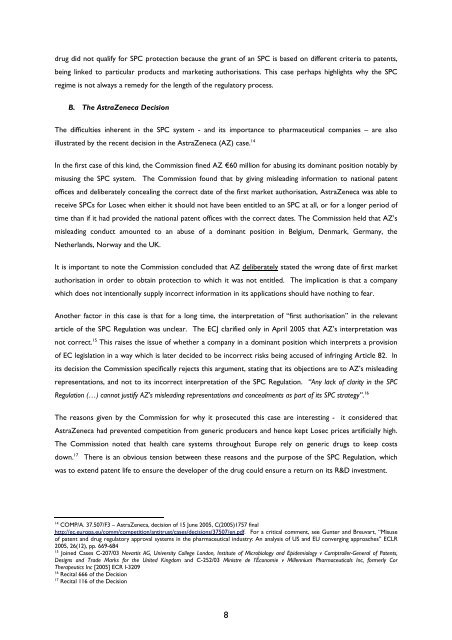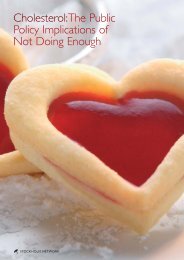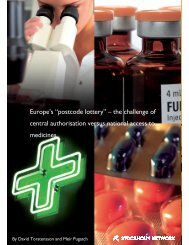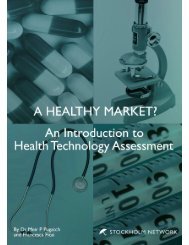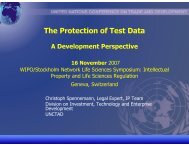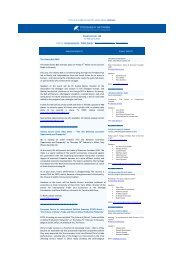Download this publication - The Stockholm Network
Download this publication - The Stockholm Network
Download this publication - The Stockholm Network
Create successful ePaper yourself
Turn your PDF publications into a flip-book with our unique Google optimized e-Paper software.
drug did not qualify for SPC protection because the grant of an SPC is based on different criteria to patents,being linked to particular products and marketing authorisations. This case perhaps highlights why the SPCregime is not always a remedy for the length of the regulatory process.B. <strong>The</strong> AstraZeneca Decision<strong>The</strong> difficulties inherent in the SPC system - and its importance to pharmaceutical companies – are alsoillustrated by the recent decision in the AstraZeneca (AZ) case. 14In the first case of <strong>this</strong> kind, the Commission fined AZ €60 million for abusing its dominant position notably bymisusing the SPC system. <strong>The</strong> Commission found that by giving misleading information to national patentoffices and deliberately concealing the correct date of the first market authorisation, AstraZeneca was able toreceive SPCs for Losec when either it should not have been entitled to an SPC at all, or for a longer period oftime than if it had provided the national patent offices with the correct dates. <strong>The</strong> Commission held that AZ’smisleading conduct amounted to an abuse of a dominant position in Belgium, Denmark, Germany, theNetherlands, Norway and the UK.It is important to note the Commission concluded that AZ deliberately stated the wrong date of first marketauthorisation in order to obtain protection to which it was not entitled. <strong>The</strong> implication is that a companywhich does not intentionally supply incorrect information in its applications should have nothing to fear.Another factor in <strong>this</strong> case is that for a long time, the interpretation of “first authorisation” in the relevantarticle of the SPC Regulation was unclear. <strong>The</strong> ECJ clarified only in April 2005 that AZ’s interpretation wasnot correct. 15 This raises the issue of whether a company in a dominant position which interprets a provisionof EC legislation in a way which is later decided to be incorrect risks being accused of infringing Article 82. Inits decision the Commission specifically rejects <strong>this</strong> argument, stating that its objections are to AZ’s misleadingrepresentations, and not to its incorrect interpretation of the SPC Regulation. “Any lack of clarity in the SPCRegulation (…) cannot justify AZ’s misleading representations and concealments as part of its SPC strategy”. 16<strong>The</strong> reasons given by the Commission for why it prosecuted <strong>this</strong> case are interesting - it considered thatAstraZeneca had prevented competition from generic producers and hence kept Losec prices artificially high.<strong>The</strong> Commission noted that health care systems throughout Europe rely on generic drugs to keep costsdown. 17 <strong>The</strong>re is an obvious tension between these reasons and the purpose of the SPC Regulation, whichwas to extend patent life to ensure the developer of the drug could ensure a return on its R&D investment.14COMP/A. 37.507/F3 – AstraZeneca, decision of 15 June 2005, C(2005)1757 finalhttp://ec.europa.eu/comm/competition/antitrust/cases/decisions/37507/en.pdf. For a critical comment, see Gunter and Breuvart, “Misuseof patent and drug regulatory approval systems in the pharmaceutical industry: An analysis of US and EU converging approaches” ECLR2005, 26(12), pp. 669-68415Joined Cases C-207/03 Novartis AG, University College London, Institute of Microbiology and Epidemiology v Comptroller-General of Patents,Designs and Trade Marks for the United Kingdom and C-252/03 Ministre de l’Économie v Millennium Pharmaceuticals Inc, formerly Cor<strong>The</strong>rapeutics Inc [2005] ECR I-320916Recital 666 of the Decision17Recital 116 of the Decision8


